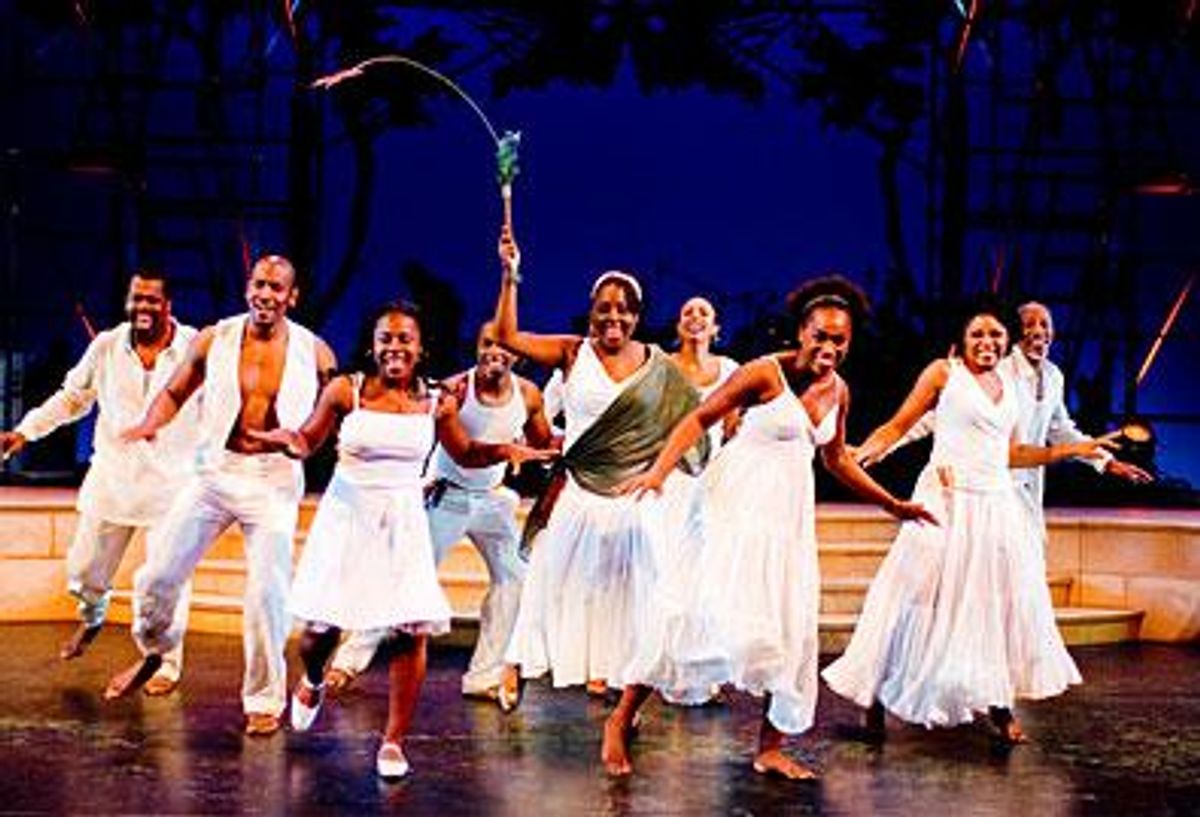I saw Once on This Island when it premiered on Broadway nearly 20 years ago; I remember it as competent but uninspired, a musical written by -- how else can I say it? -- well-meaning white folks for high-wattage black performers. Why exactly does everything work so much better in Reprise Theatre Company's revival production, which runs through September 14 at the University of California, Los Angeles's Freud Playhouse?
First, credit its director, Billy Porter, who gave one of his first interviews as an out actor in The Advocate just three years ago. At the time Porter told The Advocate, "I sing like a black woman, you know, so whenever they wanted to stop a show they'd call Billy. They didn't want to know anything else about me. And I needed nourishment."
Porter decided to stop protecting his perceived niche -- meaning, he stopped refusing to discuss his sexuality. He left all that behind when in 2005 he performed a musical memoir he wrote, Ghetto Superstar (The Man That I Am). Maybe you saw Porter's killer photo of himself in suit and red spike heels--a go-to-hell pose to rally queens everywhere.
And he started directing. Trust me, that was a good move.
With Porter in charge, Once on This Island never gives you that uncomfortable twinge: Is this story true for the performers, or are they being asked to lift vanilla material by sheer force of African-identified charisma? Porter's outstanding cast makes us believe we're on a Caribbean island -- "the jewel of the Antilles," according to the lyrics -- and feel the capriciousness of the island's gods: Earth, Water, Love, and Death.
Down on the ground, the story is like Romeo and Juliet, recast as a Caribbean folk tale that turns on the class snobbery of light-skinned, French-identified aristocracy toward the dark-skinned peasants who live at the will of the gods.
Here, Juliet is the peasant Ti Moune (Kristolyn Lloyd), who begs the gods to reveal her destiny and show her the world beyond her village. From high above the action, the gods listen. Erzulie, goddess of love (Nita Whitaker), makes a wager with Papa Ge, god of death (Bryan Terrell Clark). Love is stronger than death, and Ti Moune will prove it. Enter high-born Daniel Beauxhomme (Jesse Nager) -- Ti Moune heals him after his car crashes near her village. His people fetch him back home; against her parents' advice, Ti Moune follows. What happens next? You'll have to see.
Once on This Island is still not my favorite show. The book doesn't really work as it should; now, as on Broadway, the finale leaves me scratching my head. But this time the journey, at least, really entertains.
Choreographer Bradley Rapier, whose bio is all about hip-hop, unleashes wind and rain as well as a gumbo of seductive African-flavored dances. The ensemble is so good, so rounded, that every sung moment is a pleasure and every dance moment shines. And the scaled-down Reprise production actually helps the original show: Instead of the multicolored motley worn by the original cast, these actors are all in simple white cotton. Faces and bodies get the attention they deserve.
One of the biggest pleasures in the Reprise production is the show's big number, "Mama Will Provide," sung by the earth goddess, Asaka, to help Ti Moune on her long journey. The original production relied on the stars, LaChanze and the great Lillias White, to sell a pretty generic song. In Porter's production, "Mama Will Provide" achieves electric moments, thanks to an updated arrangement and the vocals of Ledisi, a Grammy-nominated singer-songwriter who's not half as famous as she ought to be.
A final word for my gays: As Papa Ge, the buff, seemingly seven-foot-tall Bryan Terrell Clark will make you shiver in more ways than one. And P.S.: That evil god's name? It's pronounced Papa GAY.


















































































